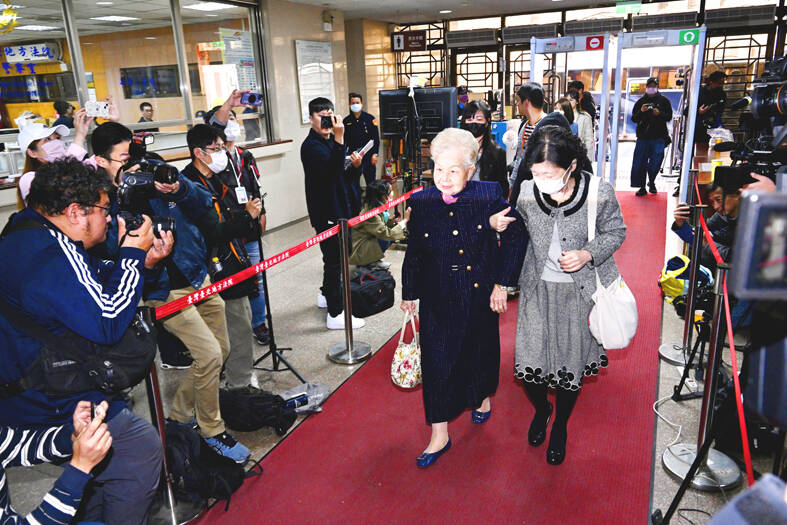Former Taipei mayor Ko Wen-je (柯文哲) on Thursday maintained his innocence and lashed out at prosecutors in his first hearing on allegations of bribery and embezzlement at the Taipei District Court.
“I did not seek illicit gains, engage in corruption or misappropriate public interests,” he told the court.
The hearing ran from 5pm to 11pm with several breaks, after which Ko was remanded to the Taipei Detention Center.

Photo: Lo Pei-de, Taipei Times
The Taipei District Prosecutors’ Office in December last year concluded investigations into the Core Pacific City corruption case. They also alleged that political donations were misused and indicted Ko and several others on charges including bribery, embezzlement and breach of public trust.
Prosecutors are seeking a total prison sentence of 28-and-a-half years for Ko.
Prosecutor Liao Yen-chun (廖彥鈞) said that Ko illegally helped real-estate conglomerate Core Pacific Group obtain its desired floor area ratio, despite knowing that the approval should not have been granted.
Ko allegedly accepted two bribes totaling NT$17.1 million (US$518,370) in exchange for helping the company, Liao said, adding that as Taipei mayor, he betrayed the public’s trust and sided with corporate interests.
Ko maintained his innocence, accusing the Democratic Progressive Party, the court and media outlets of collaborating to smear his image.
He also said Liao threatened him during the interrogation by saying that “inappropriate videos” found on a confiscated USB flash drive would be publicly released if he did not plead guilty.
Two people connected with the case have pleaded guilty: former Taipei deputy mayor Pong Cheng-sheng (彭振聲) and former Taipei Urban Planning Commission executive secretary Shao Hsiu-pei (邵琇珮).
Prosecutors said Ko pressured his codefendants who pleaded guilty by alleging, without evidence, that they were subject to improper interrogations.
Prosecutors also said Ko was “playing dumb” about the names on the files in the confiscated USB flash drive, admitting he knew about the drive during interrogation, but then claiming he did not know during the hearing.
Regarding political donations made to Muko Public Relations company, which is closely associated with Ko, prosecutors alleged that Ko used more than NT$60 million in political donations made through Muko for personal gain.
Ko said he never paid any attention to its financial records, and believed that they were just donations from supporters, and that he had no intention of embezzling the money.
Fearing that he might be a flight risk and could collude with others to destroy evidence, prosecutors recommended that Ko continue to be detained and held incommunicado until after further the cross-examinations of witnesses.
Ko said that he would not flee, and that there is no point in falsifying evidence, as the information is limited.
The court has to make a decision on whether to extend his detention before it expires on April 1.
About 100 of Ko’s supporters, including Taiwan People’s Party Chairman Huang Kuo-chang (黃國昌), gathered outside the court to protest the proceedings until the early hours of yesterday.

The manufacture of the remaining 28 M1A2T Abrams tanks Taiwan purchased from the US has recently been completed, and they are expected to be delivered within the next one to two months, a source said yesterday. The Ministry of National Defense is arranging cargo ships to transport the tanks to Taiwan as soon as possible, said the source, who is familiar with the matter. The estimated arrival time ranges from late this month to early next month, the source said. The 28 Abrams tanks make up the third and final batch of a total of 108 tanks, valued at about NT$40.5 billion

Two Taiwanese prosecutors were questioned by Chinese security personnel at their hotel during a trip to China’s Henan Province this month, the Mainland Affairs Council (MAC) said yesterday. The officers had personal information on the prosecutors, including “when they were assigned to their posts, their work locations and job titles,” MAC Deputy Minister and spokesman Liang Wen-chieh (梁文傑) said. On top of asking about their agencies and positions, the officers also questioned the prosecutors about the Cross-Strait Joint Crime-Fighting and Judicial Mutual Assistance Agreement, a pact that serves as the framework for Taiwan-China cooperation on combating crime and providing judicial assistance, Liang

A group from the Taiwanese Designers in Australia association yesterday represented Taiwan at the Midsumma Pride March in Melbourne. The march, held in the St. Kilda suburb, is the city’s largest LGBTQIA+ parade and the flagship event of the annual Midsumma Festival. It attracted more than 45,000 spectators who supported the 400 groups and 10,000 marchers that participated this year, the association said. Taiwanese Designers said they organized a team to march for Taiwan this year, joining politicians, government agencies, professionals and community organizations in showing support for LGBTQIA+ people and diverse communities. As the first country in Asia to legalize same-sex

MOTIVES QUESTIONED The PLA considers Xi’s policies toward Taiwan to be driven by personal considerations rather than military assessment, the Epoch Times reports Chinese President Xi Jinping’s (習近平) latest purge of the Chinese People’s Liberation Army (PLA) leadership might have been prompted by the military’s opposition to plans of invading Taiwan, the Epoch Times said. The Chinese military opposes waging war against Taiwan by a large consensus, putting it at odds with Xi’s vision, the Falun Gong-affiliated daily said in a report on Thursday, citing anonymous sources with insight into the PLA’s inner workings. The opposition is not the opinion of a few generals, but a widely shared view among the PLA cadre, the Epoch Times cited them as saying. “Chinese forces know full well that